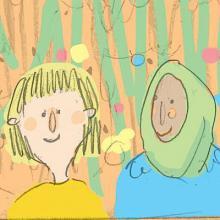Last year we worked with Future Pathways, Voices for a Better Future and the Scottish Recovery Network to look at how we might co-design peer support for care survivors supported by Future Pathways. If you aren't familiar with the term care survivors, it refers to people abused or neglected as children in the Scottish care system.
Peer support was something that care survivors had already identified that they wanted, to enhance what they were already receiving through individual support coordination, to help improve their own lives (and, of course, others).
Peer support more generally, is also ‘the direction of travel’ in many policy documents, such as the Mental Health Wellbeing and Delivery Plan 2023-25 that argues it should be championed across a range of settings. This sees the valuable role peer support can play in people’s recovery, and managing and maintaining their mental health.
Our respective project roles and strengths
Our job in Iriss was to lead and facilitate the co-design process in this joint project – to ensure the group designed the right (rather than the wrong thing); to create a space that supported collaboration and participation, was appreciative of what everyone could bring, and was mindful of trauma-informed approaches (TIA) based on five key principles: safety, trustworthiness, choice, collaboration and empowerment.
The other partners brought different things:
- The Scottish Recovery Network, knowledge and expertise around peer support and recovery;
- Future Pathway’s ‘Voices for a Better Future’ group, their lived experience of abuse and neglect, and of being a care survivor.
- And Future Pathway’s staff brought their knowledge of how the organisation works, what might be feasible and achievable as first and next steps and routes to secure funding through its Alliance Leadership Group. They also provided evaluation, safeguarding and administration support with some budget to enable the co-design group to meet in person as part of a hybrid approach that alternated between face-to-face meetings in neutral accessible venues, and online meetings.
Iriss’s task was only to take this so far – handing over to Future Pathways at the midpoint of the design council’s double diamond - for them to secure support or funding through their governance and deliberative arrangements to turn ideas into something tangible, that could be trialled, tested and grown – remembering it’s best to start small!
What we learned along the way
Our understanding of peer support in context
By the end of the project we had explored and refined our understanding of peer support, and importantly the type of peer support care survivors wanted and that would serve them well. This included an exploration of intentional peer support and CHIME Framework (and some dangers in over-sharing) as discussed in our previous blog. We also explored what peers are able to give (or not) at different stages of their own recovery journey (with this not always linear or indeed complete).
Peer support can be a slippery term, but the following definition seems helpful and one that we could all align to.
Peer support is a relationship of mutual support between people with similar life experiences. Peer support can be very powerful, especially when people are going through difficult or challenging experiences. Peer support involves sharing experiences in an intentional way and focusing on solutions that will benefit the person.
Our experts by experience from the Voices for a Better Future group, felt safe enough in this work to share some concerns, identified risks they foresaw that might need to be managed or navigated:
- A peer may not see themselves/other peers as equal
- Peer relationships might become paternalistic, especially with significant age differentials between the generations of care survivors
- It can be hard for some peers to engage in the first place!
- Peer groups may (unconsciously) exclude some peers; peer pressure might unhelpfully be applied
- Relationships between peers may break down and need support
- Peer relationships can end or tail off for various reasons- people are free to enter into them or leave
- It might seem obvious – but not all peers are the same or need or want the same things, despite having a common experience that connects them! (Different courses for different horses.)
This identified the need for facilitation and support from Future Pathways staff in supporting those peer relationships– albeit as and when needed to promote self-leadership rather than paternalism. For some the risks listed were of greater concern than others, and while some wanted ‘safeguards’ in place, others were eager to meet peers ‘on their own’ out with organisational frameworks or service boundaries.
About care survivors’ wants and needs
Through the project we learned what those supported by Future Pathways felt was missing and would enhance their lives. They wanted opportunities for care survivors to learn together, share interests, support each other, influence wider positive change and advocate for themselves and for others.
Learning together was one of the strongest themes – recognising that their experiences in care had often led to a disrupted education, with an expressed desire to learn new things or share their own skills. Creative approaches to storytelling or campaigns- whether to support peers directly, or indirectly through training and activism was another.
The final evaluation report (that you can read here) identified that in many ways, the collaborative approach of the co-design group mirrored or modelled the very support that people identified as needed. It also highlighted the importance of: creating space and time to listen and be heard, promoting hope and understanding; generating connection, community and a sense of shared purpose.
A trauma-informed approach?
Clearly, co-production can benefit and learn from other relational practices and disciplines, such as trauma informed practice, intentional peer support and recovery models amongst others.
In this project we highlighted the importance of looking after yourself (and each other) – encouraging people to take time out if they got upset or didn’t want to continue. A Future Pathways member of staff also provided a designated ‘go-to’ person for the care survivors in the group during workshops, and was also the link person to help with practical issues, such as how to get to meetings or ensure expense costs were met.
In practical terms a Trauma Informed Approach doesn’t look very different from the type of good practice we’d normally apply to co-design work but it’s worth being mindful of:
- Sharing workshop plans or meeting agendas in advance - so people know what to expect and don’t feel at a disadvantage or worry that people might be coming with their own unspoken agendas
- It may also be helpful to surface priorities for the work and build consensus during the agenda setting process itself to build trust
- Agreeing a working together agreement
- Having a workshop programme that isn’t overwhelming and allows for breaks, that provides refreshment in a space people are happy to be in
- That keeps language as plain and simple as possible
- That asks for and is responsive to feedback
- That builds in time for re-caps and reflection
- That doesn’t put people on the spot and causes anxiety to rise as a result!
- That considers what times and spaces people feel happy and safe to be in
What next?
During the project we spoke about starting small, focusing on what was achievable and meaningful, and using the evidence from testing this out to secure additional funding and grow this area of work. This allows us to be driven by evolving needs rather than come up with a final solution. It also sees change as incremental.
Starting small is also a good idea in realising peer support itself.
We look forward to seeing how this work develops in Future Pathways, and how small acorns can grow. Their very first Peer Support worker will start with them in January 2025.


